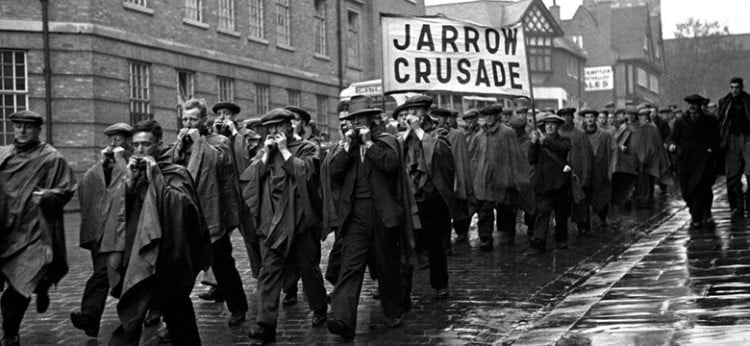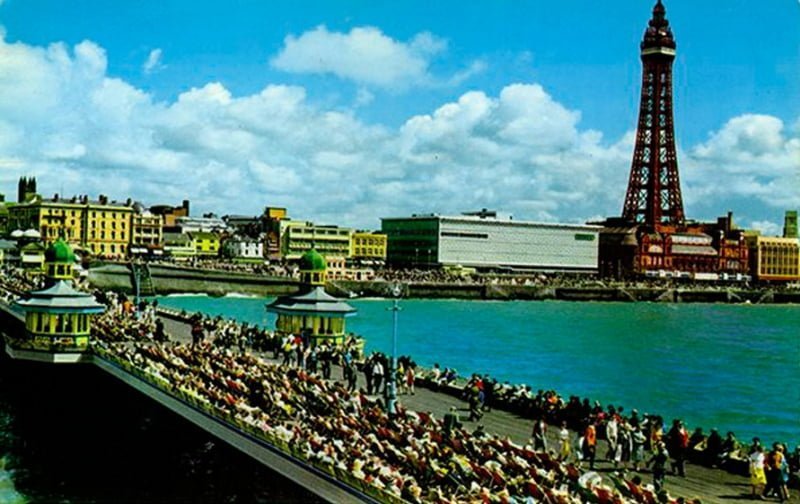In the 1930s, Labour MP Ellen Wilkinson wrote a book entitled “The Town that was Murdered”, detailing the devastating impacts of the Great Depression and British capitalism’s decline on her constituency, the town of Jarrow. Today, this book’s title could easily be used to describe the situation of many other towns across the country. Lilly Cockwill looks at the particularly tragic case of Blackpool.
Modern-day Blackpool is a very different town from the image that exists in many people’s memories. Gone are the 17 million holidaymakers from the 1960s and 70s and the huge influx of workers during the summer ‘wakes weeks’ holidays. In their place is bad housing, poor health, and the emergence of a phenomenon known to local doctors as ‘Shit Life Syndrome’ (SLS).
A recent article in the Financial Times about the town claimed that “emotionally and physically, Blackpool is unwell”. And it’s not difficult to understand why. Many of Britain’s seaside towns are facing the same fate, left underfunded and on the fringes of the country’s economy.
When the lights go out
The holiday season in Blackpool lasts from Easter to early November, ending simultaneously with the turning off of the town’s famous night-time illuminations. After the lights go out, many of Blackpool’s residents are left without a job, or with dramatically reduced pay. A taxi driver mentioned in the FT article talks of how in the summer season he averages £70 a day, yet just £30 a day in the winter months.
Another man recounts a story of how he applied to work at Blackpool Pleasure Beach. In a group interview, another candidate there had worked 4 out of 5 of the last tourist seasons – yet he was forced to reapply with the new applicants because there were no long-term contracts for him to take. This precarious, unstable cycle of casual jobs has left many of Blackpool’s residents in a dire economic situation, many of them being forced into debt through no fault of their own.
There is no light at the end of the tunnel for Blackpool’s residents – just next year’s illuminations and, with them, temporary work contracts. No stable jobs are being created.
The seaside town’s economy has been heavily reliant for most of the last century on ‘wakes weeks’ – a week off given to industrial workers in the summer as factories are closed for maintenance. With the decline of Britain’s industrial sector, the economic weaknesses of Blackpool and similar such towns have become shockingly clear. With industries like coal, steel and textiles all but destroyed from the 1980s onwards under the Tories and New Labour, Blackpool too finds itself on the verge of destruction. Capitalism and its political representatives offer no solutions whatsoever.
Shit Life Syndrome
This bleak and fraught future of flitting from job to unstable job has unsurprisingly had a detrimental effect on the mental and physical health of those who live in Blackpool.
The exposure to sea air is fabled to have wonderful healing properties, such as strengthening the immune system and improving circulation. But no such improved health is now afforded to the residents of Blackpool. Life expectancy has been below the UK average since 1993, and has only increased by 2.3 years in that time. The average life expectancy for a man in Blackpool is just 74.3 years – almost 5 years below the national UK average of 79.2 years. The town has the highest mortality rate from alcoholic liver disease in the whole of the country.
In terms of mental health, Blackpool has the fourth highest rate of antidepressant prescriptions use in Britain and a 19 week wait between referral and entering treatment in counselling services (for comparison, the median wait time in England is 12 weeks).
Throughout the FT article, doctors vent their frustration at their inability to help patients with the newly termed SLS. Critical underfunding of the NHS means GPs are unable to spend the time required with patients who are suffering from mental illness, as they are stretched to breaking point with endless 10-minute appointments that barely scratch the surface of the problems of people who are desperate for help.
Both GPs and Blackpool residents identify this problem, with one doctor saying that the only solution is to tackle these health issues ‘in a more holistic and wider way’. But such an approach is a pipe-dream under Tory austerity, with cuts and privatisation dismantling the NHS. There can be no holistic approach to healthcare under this crisis-ridden capitalist system.
In the profit-led world we live in, it is better – it seems – to have a worker indefinitely on antidepressants, rather than tackling the problems in society (of debt, precarious jobs, bad housing, and so on) that cause the intense stress and anxiety which lead to serious illnesses such as depression and addiction.

The evil of capitalism
In the 1930s, Labour MP Ellen Wilkinson wrote a book detailing the devastating impacts of the Great Depression and British capitalism’s decline on her constituency, the town of Jarrow. The name of Jarrow is now largely remembered for its mass march of unemployed residents, who – in 1936 – walked all the way from Tyneside to London in order to petition the government for jobs.
Wilkinson entitled her book “The Town that was Murdered”, writing in it that “Jarrow’s plight is not a local problem. It is the symptom of a national evil.”
Decades later, it is clear that this evil still exists. The symptoms: the scars of mass deindustrialisation, as seen in Blackpool and in similar towns across the country.
This evil, at root, is capitalism: a system where the economy is run in the interests of the profits of the few, not the needs of the many; a system that is inherently anarchic and crisis-ridden, parasitically killing off jobs and livelihoods; a system that demands austerity and attacks on the working class and their towns.
Under capitalism, there is no way out of this downward spiral. Yet the problems facing the residents of Blackpool could be decisively wiped out with a socialist programme of radical change. Blackpool and countless other small tourist towns like it could be liberated from their continuing decline.
With a socialist plan of production, run democratically for the majority, we could see these towns properly funded and revitalised, with decent jobs, services, and housing guaranteeing the wellbeing of workers, the elderly and the poor. Only in this way can we stop capitalism murdering our towns.






